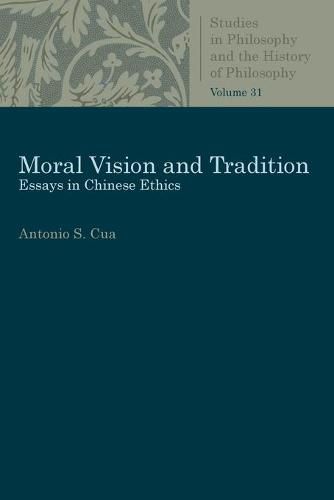Readings Newsletter
Become a Readings Member to make your shopping experience even easier.
Sign in or sign up for free!
You’re not far away from qualifying for FREE standard shipping within Australia
You’ve qualified for FREE standard shipping within Australia
The cart is loading…






This volume offers a comprehensive philosophical study of Confucian ethics-its basic insights and its relevance to contemporary Western moral philosophy. Distinguished writer and philosopher A. S. Cua presents fourteen essays which deal with various problems arising in the philosophical explication of the nature of Chinese ethical thought. Offering a unique analytical approach, Cua focuses on the conceptual and dialectical aspects of Confucian ethics. Among the topics discussed are: the nature and significance of the Chinese Confucian moral vision of tao; the complementary insights of Classical Taoism, namely of Lao Tzu and Chuang Tzu; and the logical and rhetorical aspects of Confucian ethics. Perhaps more relevant to contemporary East-West ethical discourse, several essays present an introduction to a systematic Confucian moral philosophy. Cua explains the idea of a living, Confucian, ethical tradition and highlights the problem of interpreting the cardinal concepts of Confucian ethics as an ethics of virtue. Much of the effort is spent in shaping concepts such as jen (humanity), I (rightness), and li (ritual propriety) in the light of the Confucian ideal or vision of tao. Cua concludes with a discussion of the possibility of reasoned discourse, aiming at a resolution of intercultural, ethical conflict. This book will appeal to a broad spectrum of scholars interested in ethics, Chinese philosophy, comparative Chinese and Western ethical thought, and Confucianism.
$9.00 standard shipping within Australia
FREE standard shipping within Australia for orders over $100.00
Express & International shipping calculated at checkout
This volume offers a comprehensive philosophical study of Confucian ethics-its basic insights and its relevance to contemporary Western moral philosophy. Distinguished writer and philosopher A. S. Cua presents fourteen essays which deal with various problems arising in the philosophical explication of the nature of Chinese ethical thought. Offering a unique analytical approach, Cua focuses on the conceptual and dialectical aspects of Confucian ethics. Among the topics discussed are: the nature and significance of the Chinese Confucian moral vision of tao; the complementary insights of Classical Taoism, namely of Lao Tzu and Chuang Tzu; and the logical and rhetorical aspects of Confucian ethics. Perhaps more relevant to contemporary East-West ethical discourse, several essays present an introduction to a systematic Confucian moral philosophy. Cua explains the idea of a living, Confucian, ethical tradition and highlights the problem of interpreting the cardinal concepts of Confucian ethics as an ethics of virtue. Much of the effort is spent in shaping concepts such as jen (humanity), I (rightness), and li (ritual propriety) in the light of the Confucian ideal or vision of tao. Cua concludes with a discussion of the possibility of reasoned discourse, aiming at a resolution of intercultural, ethical conflict. This book will appeal to a broad spectrum of scholars interested in ethics, Chinese philosophy, comparative Chinese and Western ethical thought, and Confucianism.